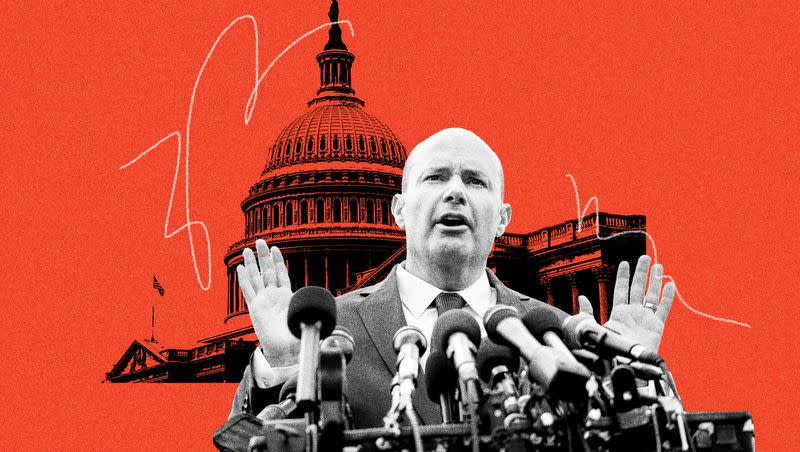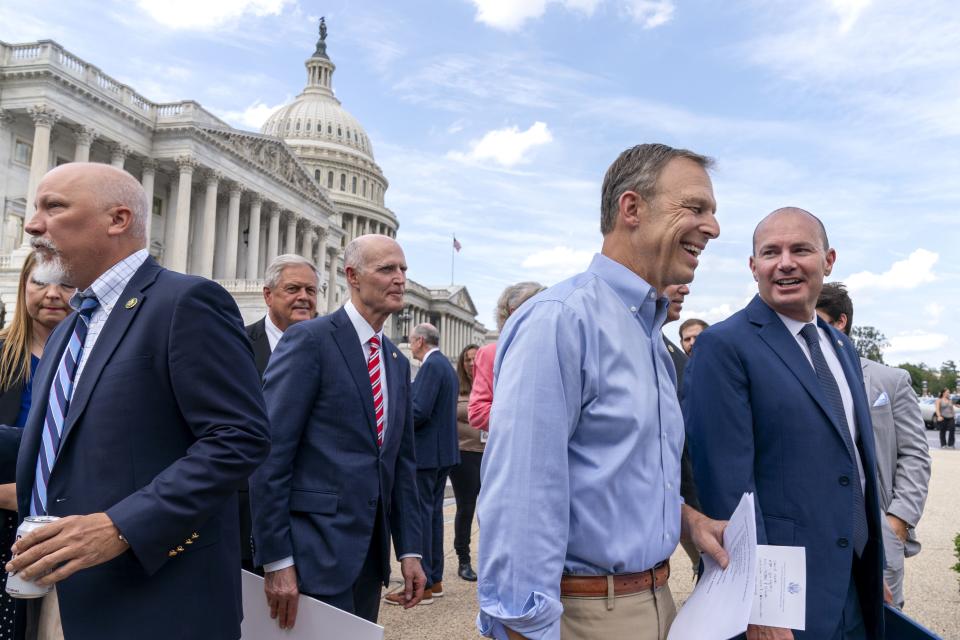Sen. Mike Lee doesn’t want a shutdown, but wants ‘out-of-control’ spending to stop

Amid stalled spending talks in Congress, Utah Sen. Mike Lee said he hopes Republicans can avoid a shutdown.
With temperatures high on Capitol Hill because of disagreements over how to proceed with negotiations, Lee, Utah’s senior U.S. Senator, spoke with the Deseret News about how we got to this point and why this spending fight might be different than others in recent years.
“I don’t think deep down anyone in Congress would choose a shutdown,” Lee said. “That is not a good thing for anyone.”
But as worries grow over a ballooning national debt, the country appears to be heading towards its fifth “true” shutdown, and the first since January 2019, which would impact “non-essential” government services as hundreds of thousands of federal employees are furloughed.
Lee said he would have voted in favor of a continuing resolution that House Speaker Kevin McCarthy brought to members of the House of Representatives this week. It failed to win enough votes to pass the House, bringing Congress one step closer to a shutdown.
But Lee provides a caveat to his support — he said Republicans in both chambers must stand up to party leadership to reform the appropriations process and get spending under control.
“What’s happened is that the debt, and the interest on the debt, has finally caught up to us to the point where people in both houses of Congress are starting to be really worried and they’ve seen the cycle repeat itself so many times,” Lee said.
Members of Congress want things to be different, Lee explained, during an extended conversation. “The question is just how much they’re willing to stand up to leadership and say ‘No.’”
Congress edges towards shutdown
This week, the House Republican conference struggled to agree on language for a continuing resolution, a short-term measure that would give them more time to work through the 11 remaining annual spending bills beyond the deadline when government funding expires at midnight on Sept. 30.
A handful of members of the House Freedom Caucus — between five to 10, depending on the vote — have stymied Speaker Kevin McCarthy at every turn, saying they will never support a continuing resolution or omnibus spending package. These holdouts caused the House to close shop early on Thursday after several failed votes — effectively canceling a continuing resolution vote scheduled for Saturday.
Lee respects those who voted against the continuing resolution, saying the “GOP is showing greater political will on this front than you have seen in the past,” but said if he “were in the House,” he would have voted in favor of the stopgap spending measure.
“I was encouraging people over there to support stuff like that, because the way they did that I thought brought about some reforms, while reducing the risk of a shutdown,” Lee said.
The deal, negotiated by members of the House Freedom Caucus and the Main Street Caucus, would have extended funding for Congress’ 12 appropriations bills until Oct. 31 at slightly less than FY 2023 levels.
It included an 8% cut in discretionary spending across all government agencies — excluding disaster, defense and veterans funding — in addition to including provisions from the Secure the Border Act, which would defund Biden administration policies related to transporting immigrants who enter the country illegally and processing asylum claims.
“Some of the guys in the House who opposed this thing this week did so on the grounds that ‘I will never vote for any (continuing resolution).’ I don’t share that view at all,” Lee said. “A (continuing resolution) can serve an appropriate purpose. ... And I thought that (continuing resolution) was good.”
McCarthy has promised he will try again to pass a stopgap funding measure next week. But a few Freedom Caucus members have gone as far as to argue a shutdown is necessary to catalyze a dramatic shift in the way Congress approaches spending.
“The way we do things in this town has to change,” said Arizona Republican Rep. Eli Crane on Friday. “And, unfortunately, the only way we’re going to get any change in this town is through force.”

While saying it’s not his place to make judgements about “internal House dynamics,” Lee suspects House Republicans holding this view, like Crane, or Matt Gaetz, R-Fla., want to strengthen their negotiating position by not committing to avoiding a shutdown and might be concerned that by passing a continuing resolution they would signal things can return to business as usual, with party leadership stitching together a massive spending bill and forcing a last minute vote.
Despite Republicans lacking control of the Senate or White House, Lee says the Republican majority in the House should mean something.
“And there are a number of them that want it to mean something,” Lee said. “And they want to make sure that there are some Republican priorities, especially spending, that are addressed in some meaningful way.”
Senate Majority Leader Chuck Schumer said Friday if the House doesn’t pass a stopgap bill, the Senate, in an unusual move, will send their own to the House for a bipartisan vote. And moderate House Republicans have already threatened to join forces with their Democratic colleagues to circumvent McCarthy and approve a stopgap funding bill if the dysfunction continues — which would likely result in a conservative backlash and McCarthy potentially losing his speakership,
Lee said if Senate leadership produces a continuing resolution he will judge whether to give or withhold his support based “on a number of factors,” but he is not opposed to the idea.
At the time of the interview, Lee had just gotten off the phone with some House and Senate colleagues who said there were efforts to pass several appropriations bills in the next few days to “at least get part of the government funded” in case next Saturday’s deadline arrives with no continuing resolution.
When asked what a conservative “win” would look like coming out of next week’s appropriations battle, Lee’s focus was more on a shift in expectations than a breakthrough solution.
“It would be a good thing if we could avoid a shutdown in a way that doesn’t entrench the omnibus package and that builds support for dealing with these bills one by one, that builds support for the idea that we need to rein in federal spending and have more accountability,” Lee said.
How did we get here?
While prescriptions may differ among fiscal hawks within the House, and between the House and the Senate, Lee says their diagnosis is the same: Congress’ spending process has deteriorated in recent decades to the point that serious procedural changes are necessary.
Invariably, every year, Lee says, the leadership of both parties in the House and the Senate refuse to pressure appropriators to meet certain deadlines and also delay bringing appropriations bills to the floor. Such scheduling malpractice creates a sense of urgency come each September, Lee says, giving the House speaker and Senate majority leader permission to make appropriations discussions private, only to reveal a massive omnibus spending package — where all 12 appropriations bills are combined — just days, or sometimes hours, before the deadline.
This process, which has become the norm, according to Lee, reduces the window for congress members to debate controversial issues, amend specific provisions, or completely understand the way Congress spends taxpayer funds and borrows money every year, even as it centralizes more power in the hands of party leadership — what Lee calls “the firm.”
“One of the problems with that is the firm tends to not be very cautious about how we spend money,” Lee said. “This is how we end up with trillion dollar, sometimes multi-trillion, dollar annual deficits. And that’s exactly why we’re $33 trillion in debt now, is that this has gone on for year, after year, after year. ... It makes the firm and those who assist in this process more powerful every time they do it. But it does so at the expense of the American people.”
Related
Can Republicans overcome infighting to prevent a government shutdown?
Govt. shutdown likely because ‘holdouts’ want to ‘sabotage’ spending cuts, Rep. Moore says
What needs to change?
Lee said he “wholeheartedly” supports rule changes secured by House Freedom Caucus members during the debt ceiling deal, and the efforts of Sen. Ron Johnson, R-Wis., in the Senate, to reinstitute the norm of voting on spending bills separately.
“The way it’s supposed to work is that Congress is supposed to pass spending bills by category,” Lee said, listing the dozen categories from memory. “The reason that we should do it that way, and it works better that way, is because you don’t want funding for one part of government, and disputes surrounding that, to be held hostage to hold back funding for every other part of government. It becomes dangerous.”
Lee hopes the current spending fight will communicate to House and Senate leadership, who control the calendar of when members of Congress are in session and when bills will appear for a floor vote, that in the future they must incentivize Appropriations Committee members to finish their proposals, and members of Congress to work through them, long before the fiscal year nears its end.
He also supports the Prevent Government Shutdowns Act, sponsored by his colleagues Sens. James Lankford, R-Okla, and Maggie Hassan, D-N.H., and championed by Sen. Johnson in recent days, that would avert shutdowns — and remove them as leverage to pass an omnibus bill — by initiating an automatic 14-day continuing resolution upon reaching the appropriations deadline and requiring lawmakers to stay in Washington seven days a week to work through each of the 12 spending bills until a final budget is passed.
According to Lee, this would allow lawmakers sufficient time to amend bills and discuss spending cuts with more seriousness, and without the threat of a government shutdown.
“The American people and the people of Utah, regardless of what their view of any particular government program is, and regardless of what they think is the appropriate level of government sponsored spending, either generally or in any particular area, they all have an interest in having Congress, as an elected legislative body, be in a position where each member can have adequate time to review and debate and discuss and confer with their constituents about spending levels and the contents of a spending bill,” Lee said.
“This is about restoring that. And by restoring that we will be in a better position to control total levels of spending, and with it our out-of-control debt and deficit, which is going to cripple us if we don’t stop it.”

